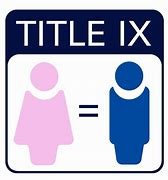
Oke, berikut adalah sebuah paragraf pembuka untuk artikel tentang Title IX dengan sedikit sentuhan SEO Friendly:
Title IX of the Education Amendments Act of 1972: A Landmark Law Protecting Equality in Education
Title IX of the Education Amendments Act of 1972 is a landmark federal law that prohibits sex discrimination in education programs & activities receiving Federal financial assistance. It’s a game-changer that’s paved the way for equal opportunities for girls & women in all aspects of education, from academics & athletics to campus safety & employment. But what does this mean in practical terms? How does Title IX impact your life?
Imagine a world where girls weren’t allowed to play sports or take certain science classes , a world where they were denied admission to prestigious colleges or even faced harassment on campus , that was the reality for many before Title IX came along . This law fundamentally changed the landscape of education in the U.S., ensuring equal opportunities for both sexes , regardless of their gender identity or sexual orientation.
With a reach extending to colleges, universities , K-12 schools , and even some private schools & institutions, Title IX stands as a vital pillar of protection , safeguarding the rights of students, athletes , & employees , guaranteeing them a fair & equitable learning & working environment . Its implications extend beyond just the classroom, impacting sports participation, financial aid access , and even access to resources like counseling & mental health services .
Related Post : act like a lady think like a man book
Join us as we delve deeper into the significance of Title IX , exploring its history, its current applications , and the ongoing challenges faced in ensuring its continued implementation. Get ready to learn how this powerful law continues to shape the education landscape & empower girls & women across the country.
Title IX: A Powerful Tool Against Sex Discrimination in Education
Title IX, a landmark federal law passed in 1972, has profoundly impacted the landscape of education in the United States. This legislation, formally known as Title IX of the Education Amendments Act of 1972, prohibits sex discrimination in any education program or activity receiving federal financial assistance. Title IX has been instrumental in promoting equal opportunities for women and girls in education, athletics, and beyond.
What is Title IX?
Title IX is a thorough civil rights law that ensures equal access to education for all individuals, regardless of sex. It applies to all educational institutions that receive federal funding, including public and private schools, colleges, and universities. This means that Title IX covers a wide scope of educational activities, from admissions and financial aid to athletics and student life.
The History of Title IX
The passage of Title IX was a watershed moment in the fight for gender equality. Prior to its enactment, women and girls faced significant barriers in education, often being denied access to opportunities available to their male counterparts. The need for change became increasingly apparent, leading to the passage of Title IX as part of the Education Amendments Act of 1972.
The Need for Change: Why was Title IX Created?
The creation of Title IX stemmed from the persistent and pervasive discrimination against women in education. Women were often excluded from certain academic programs, denied access to scholarships and financial aid, and faced limited opportunities in athletics. Title IX was designed to address these inequities and ensure that women had equal access to educational opportunities.
Key Provisions of Title IX
Title IX outlines several key provisions that ensure equal treatment for all individuals, regardless of sex. These provisions include:
- Equal access to educational programs and activities: This includes access to all courses, extracurricular activities, and academic support services.
- Equal opportunities in athletics: Title IX requires schools to offer equal athletic opportunities for women and men, including scholarships, coaching, and facilities.
- Equal treatment in admissions and financial aid: Schools cannot discriminate on the basis of sex in their admissions policies or in the allocation of financial aid.
- Protection from sexual harassment and assault: Title IX prohibits any form of sexual harassment or assault in educational settings.
Title IX and Sex Discrimination in Education: A Deeper Dive
Title IX’s impact extends far beyond simply ensuring equal access to educational opportunities. It has also played a crucial function in creating a more inclusive and equitable learning environment for all students.
What Constitutes Sex Discrimination Under Title IX?
Sex discrimination under Title IX encompasses a wide scope of behaviors, including:
- Discrimination on the basis of pregnancy or childbirth: Schools cannot discriminate against students or employees based on their pregnancy or childbirth.
- Discrimination based on sexual orientation or gender identity: While Title IX does not explicitly mention sexual orientation or gender identity, courts have interpreted the law to prohibit discrimination based on these factors.
- Discrimination based on gender stereotypes: Schools cannot treat students variedly based on traditional gender functions or stereotypes.
Examples of Title IX Violations
Title IX violations can take many forms. Here are some examples of common violations:
- Discrimination in Admissions: Denying admission to a student solely based on their gender or denying them access to specific programs or courses.
- Discrimination in Athletics: Providing unequal athletic opportunities for women and men, such as fewer scholarships, less coaching support, or inferior facilities.
- Discrimination in Access to Educational Programs: Limiting access to certain academic programs or extracurricular activities based on a student’s gender.
- Sexual Harassment and Assault: Creating a hostile environment for students through unwelcome sexual advances, requests for sexual favors, or other forms of verbal, nonverbal, or physical harassment.
The Impact of Title IX on Education
Title IX has had a profound impact on education in the United States. Its provisions have led to significant improvements in:
- boostd Opportunities for Women in Athletics: Title IX has led to a dramatic boost in participation in women’s sports, opening up new opportunities for female athletes and promoting their athletic development.
- Greater Access to Education for Women and Girls: Title IX has ensured that women and girls have equal access to education, leading to boostd enrollment rates in colleges and universities and greater representation in STEM fields.
- Improved Safety and Security for Students: By addressing sexual harassment and assault, Title IX has created a safer and more secure learning environment for all students.
Understanding Your Rights Under Title IX
It’s crucial for all students to understand their rights under Title IX. Knowing your rights empowers you to speak up against discrimination and seek redress if necessary.
Who is Protected by Title IX?
Title IX protects all students, regardless of their sex, gender identity, or sexual orientation. This includes students attending elementary schools, high schools, colleges, and universities.
How to File a Title IX Complaint
If you believe that you have been subjected to discrimination or harassment based on your sex, you have the right to file a Title IX complaint. Each educational institution has its own process for filing a complaint.
Resources and Support for Students
If you have experienced discrimination or harassment based on your sex, there are resources available to help you.
- Title IX Coordinators: Every educational institution has a Title IX coordinator who is responsible for handling complaints and ensuring compliance with the law.
- Campus Resources for Sexual Assault and Harassment: Many colleges and universities offer support services for students who have experienced sexual assault or harassment, including counseling, legal assistance, and advocacy.
Conclusion: Title IX – A Legacy of Equality and Progress
Title IX stands as a testament to the power of legislation to promote equality and chance. This landmark law has transformed the landscape of education, ensuring that women and girls have equal access to education and the chance to reach their full potential.
Call to Action: How You Can Support Title IX
Title IX is a vital law that continues to shape the future of education. You can support Title IX by:
- Educating yourself about your rights under Title IX.
- Speaking out against discrimination and harassment.
- Supporting organizations that promote gender equality in education.
- Encouraging others to learn about Title IX and its importance.

Leave a Reply